
From Ukraine peace plans to Kazakh uranium—all that and more in our new nuclear digest
Our November Nuclear Digest by Bellona’s Environmental Transparency Center is out now. Here’s a quick taste of just three nuclear issues arising in U...
News

Publish date: December 17, 2013
Written by: Charles Digges
News
TALLINN, Estonia – Every couple of weeks, Suren Gazaryan, a Russian national born in Georgia, shuffles between Estonia and Germany in search of asylum after being accused of attempted murder at home for outing the environmental evisceration and corruption paving the Kremlin’s road to the 2014 Winter Olympic Games in Sochi.
If anyone is discussing issues of official extortion, ecological ruin, secret slush funds, and the extermination of one of the world’s most treasured landscapes at all, they have Gazaryan’s quiet, methodical, relentless, organized documentation and the work of the Environmental Watch on the North Caucasus (EWNC) to thank – or, in the case of the Kremlin, to blame.
Based in small towns with a headquarters office in Sochi, the group began as a collective of concerned citizens who feared encroachment on the Krasnodar Region’s protected national forests and seashores.
Ever since the Olympic bid ramped for the Sochi Games ramped up, the site has become a kind of ecological Wikileaks in Russian, documenting one governmental abuse, one illegal landfill and one graft scheme after another.
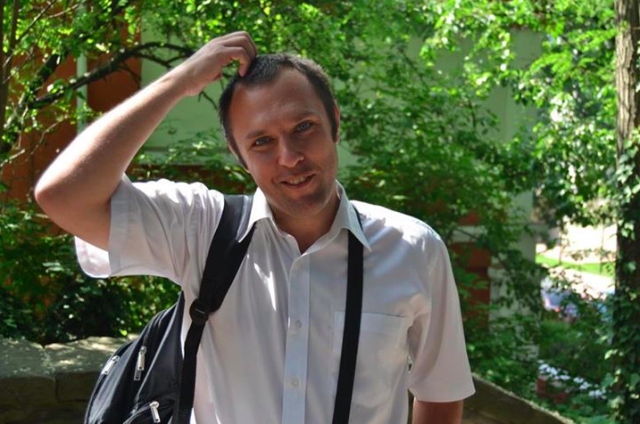
Understandably, the authorities are not happy, and engaged a local and national campaign to tar the organization’s credibility. And though several of the group’s founding members, are in the wind, this has not prevented them, especially Gazaryan, from documenting the frenetic razing of the landscape.
Most expensive Games in history missing $30 billion
Fifty one billion dollars of state and private funding have been pumped in to Sochi 2014, making it the most expensive Olympics in history.
Russian politician and a former deputy prime minister, Boris Nemtsov, a Sochi native and no friend of the Kremlin, said his own investigations in an interview with Al Jazeera English reveal that $30 billion of that has been spent on anything but the Olympics – “basically stolen” he said, to grease palms and “line pockets.”
“It’s shameful, disturbing and causes a feeling of hatred for the people who are involved in making the Sochi Games ugly,” said Nemtsov.
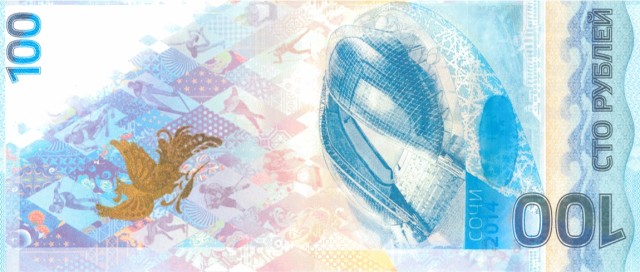
President Vladimir Putin is depending on the Games to showcase the “Modern Russia” free now of street demonstrations against his rule and the vote rigging that preserved his power. And free, as well, of irritating social dissent.
But to Gazaryan, the gob-stoppingly colossal investment into Sochi 2014 is the modern Russia – venal, vain and myopic.
The Games begin in 43 days, running from February 7 to 23. By that time, the toxic landfills, swathes of national forests felled to make way for Olympic venues and palatial estates for Russia’s politically anointed, the poisoned rivers and drinking water, the species nearing extinction and the limestone quarries gouged into protected lands will fade from public attention, eclipsed by the race for medals.
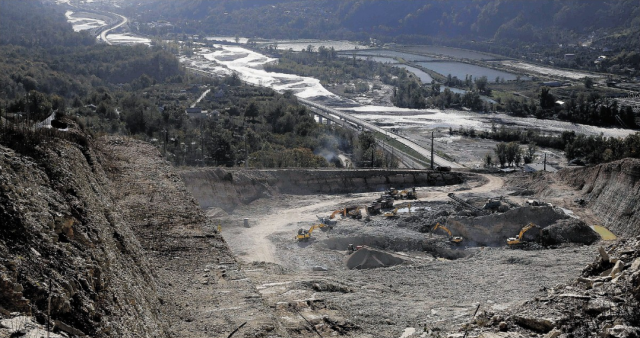
Until then, builders continue to dump literal tons of untreated construction and household waste in makeshift landfills – most of which remain undocumented but by environmentalists – overtaking protected lands throughout the once pristine Krasnodar region – a giant welch on Russia’s promised “Zero Waste Games” promise.
According to the United Nations Environmental Program (UNEP), 3.5 billion tons of waste was generated during Olympic preparation in 2009 alone.
Olympic ‘Zero Waste’ pledge seems empty
Construction vehicles and garbage trucks slow traffic to a Moscow-like gridlock on roads between coastal, temperate Sochi, with its population of 400,000, and the Caucasus Mountain ski slopes of Krasnaya Polyana 45 kilometers to the north, causing smog that is utterly foreign to the area, say activists.
The junk being documented has come about partly because Sochi – where the average February temperature hovers around 5-7 °C – is just not a winter town. In other words, the Russian Olympic Organizing Committee’s Games-building effort has been an exercise in building winter from scratch – something akin to popularizing igloos in Ibiza.
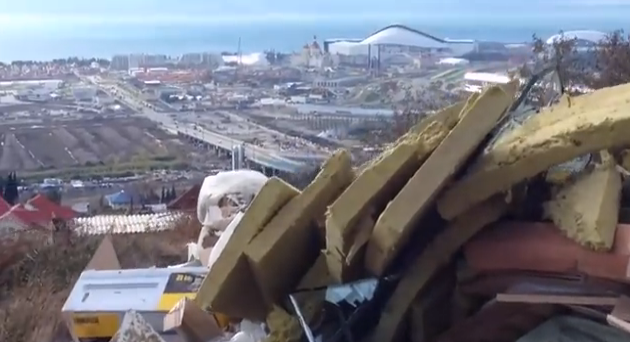
To change the local seasonal cycle, the Organizing Committee has constructed, by their own statistics, more than a dozen venues in separate coastal and mountain complexes with over 367 kilometers of roads, 200 kilometers of railway, and 170 kilometers of gas pipelines. Sochi has even stored 450,000 cubic meters of snow to ensure a white Olympics come February 7.
Dozens of local species of plant and animal life were at risk even before the Kremlin’s Olympic juggernaut descended on the 1,938 square kilometer site of Western Caucasus National Park. These include the Persian leopard – now one of the mascots of the Sochi games. If it goes extinct, at least it will be commemorated on t-shirts and coffee mugs
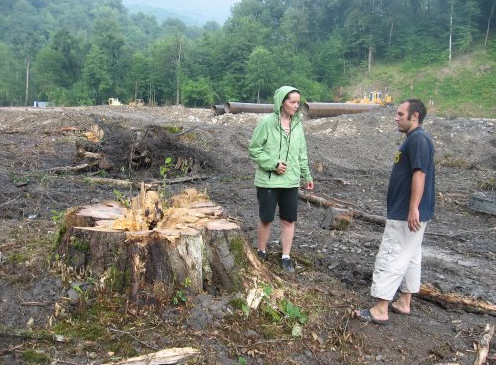
Krasnaya Polyana itself – once Russia’s premier ski resort – remained until early December,a dirt and mud track, besieged with cranes and half-built ski lifts, and lit by the sparks of welders’ torches. It has now been covered by the storehouse of snow.
Russian officialdom, meanwhile, is putting activists who release these revelations in a vise-grip, and the crackdown has been so hard that essentially all of Gazaryan’s colleagues have been muzzled by one means or another – or have made their way to higher ground.
Some local voices remain, harried by absurd, distracting legal charges like slander, some under house arrest, others followed by police waiting for them to trip up – or the opportunity to plant incriminating evidence.
Lobbing grenades from exile
Gazaryan knows he has little time to give testimony, which, at the moment, comes in the form of daily social media posts that go viral. He has a habit of following the money that leaves bloody footprints to the crime scenes, and an impenetrable diffidence when it comes to discussing the explosive revelations his detective work leads to, as if to say – anyone could have done it.
In that sense, he is not a placard-waver or a traditional marcher, not the stereotype of someone chaining himself to a tree against a bulldozer that the word “environmentalist” so often conjures. Though he has led rallies, it didn’t start that way.
A zoologist by training, he began to notice changes on the plot of land along the Black Sea coast he used to call home. Plant species began to look anemic. Wildlife sightings became less frequent. The air took on an acrid quality, and traffic on the once silent roads – roads so forgotten that the passage of one vehicle would be remembered for a week – became unbearably noisy.
In short, he got pissed off, and began documenting abuses. He uncovered an avalanche.
For the moment, he sleuths from any café in this sleepy Baltic capital that has a Wi-Fi signal, analyzing online newspapers from his home area in Russia, reviewing tweets from those activists still left in Krasnodar Region, and putting two and two together. Here, as there, where he was forced to leave a modest country home, he seems to prefer silence in which to think.
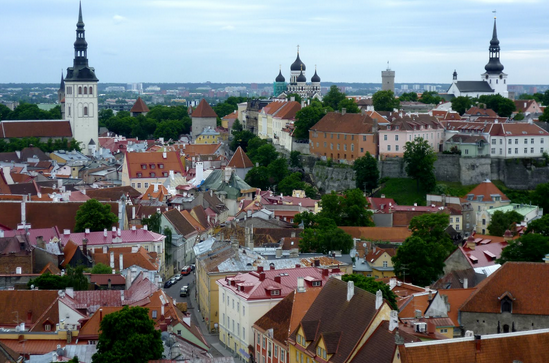
“Tallinn is cheap and quiet and I have a few friends here,” Gazaryan, 39, told Bellona in a recent interview, explaining his choice of temporary domicile in the forlorn winter light of a nearly abandoned cafe. “The prospects for finding a good job might be better in Germany, though – but to get political asylum there, you have to wait for approval in a refugee camp, sometimes for six months.”
From either location – a rock and a hard place – he uses Skype on his laptop to communicate with his wife and two daughters, 10 and 13, who live in a small town in the North Caucasus that he would prefer to leave unnamed. Cell phones are too dicey. Being a fugitive – as he was officially declared by the Russians last December – has necessitated traveling light.
The question from his family about when he is coming home is always awkward. And the answer depends almost exclusively on the whim of the Krasnodar Regional Governor.
Regional governor hunting Olympic game
That governor, Alexander Tkachev, authoritarian and arbitrary, holds much of the responsibility for smoothing the mammoth transition of Sochi – a fixture in the Russian imagination signifying sunlight, warmth and the salubrious and restorative waters of the Black Sea – into the world’s most expensive winter sports park.
His successes thus far have endeared him to Putin’s court; any failures will certainly mean his head.
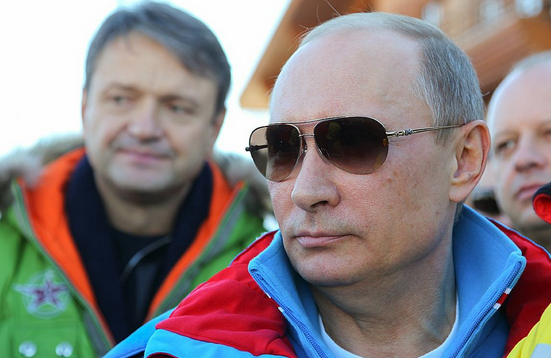
As such, Tkachev and the Kremlin have taken to mounting a few heads of their own, namely those of activists and reporters who are bringing unwanted attention to the environmental cesspools popping up in the region since Sochi suspiciously overcame staggering odds to win its 2007 bid.
This hunt has taken the form of arbitrary arrests, government searches and detentions, intimidation, attacks, surveillance, NGO shutdowns and a general smother campaign violating nearly every protection the Olympic Charter is meant to afford citizens of countries that prepare to host the Games. It has also drawn the ire of Amnesty International, Reporters Without Borders, and Human Rights Watch, the latter calling on Russia to “stop harassing and detaining environmental activists and allow them to carry out their work.”
Private mansions built on public lands and funds
Gazaryan and the EWNC have borne the brunt of this oppression for their nearly scientific documentation of government-sponsored environmental abuses since ground was first broken to prepare for the $51 billion festival.
Aside from the now famous landfill in the town of Akhshtyr, bursting with industrial and construction waste from the rail line between Sochi and the mountain venues, Gazaryan – even from exile – has, with the unwitting help of the state’s Federal Service for Supervision of Natural Resources, known as Rosprirodnadzor, documented another 50 illegal landfills throughout Krasnodar Region where Olympic construction companies covertly dispose of their waste.
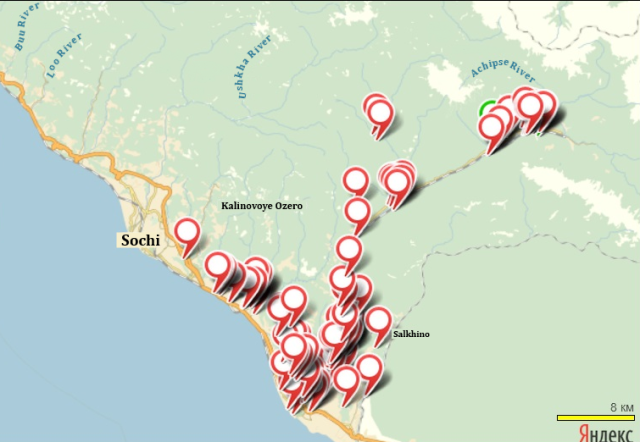
Sometimes the waste doesn’t even make it to the dumps and is just chucked at roadside. Living within two kilometers of these landfills, says Konstantin Tsybko, chairman of the Pan-Russian Nature Conservation Society, is “impossible.”
On the ground itself, Akhshtyr locals have stopped swimming in the Mzymta River, now clogged with a stew of construction grime. Wells have run dry of water, which has been diverted to mix hundreds and thousands of tons of concrete. Quarries carved into the surrounding protected forests have issued a cloud of dust coating the region’s persimmon fruit that grows in the area, making it unsellable.
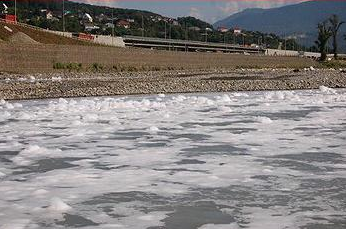
Added to this, a good share of what is billed as the most expensive Games in history has gone into clear-cutting protected forest lands to build ascendant, gaudy summer estates for Moscow’s hand-picked Olympic movers and shakers. And this is where Gazaryan and the EWNC’s Kafkaesque labyrinth began.
The ‘dacha’ domino effect
On August 2, 2012, Gazaryan and a number of other ENWC activists were apprehended while performing an impromptu environmental inspection of a large pier that sprang up in the protected waters off the Black Sea coast near the town of Gelendzhik.
The group was confronted by security personnel wielding truncheons. Gazaryan picked up a rock and asked the guards not to let the situation degrade into violence. They were let go, but there were two big problems.
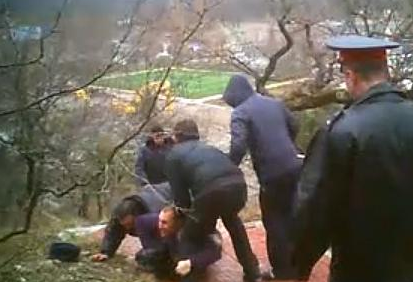
First, Gazaryan and his EWNC colleague Andrei Vitishko were convicted on criminal charges two months earlier, in June 2012, for causing damage to a construction fence surrounding a private “dacha” – or summer home – built in a rented section of a protected forest for Governor Tkachev. Human Rights Watch called the trial over the fence around the dacha “politically motivated” and “flawed.” Gazaryan and Vitishko were given suspended sentences with the condition that they comply with a curfew and stay within the jurisdiction.
Gazaryan told Bellona that the group had targeted the fence without incident for three prior to the one leading to his and Vitishko’s arrest. EWNC’s Facebook page says that a section of the fence was cut down to permit activists’ inspections of the public forests and protected tree species it enclosed. The activists discovered that the fence concealed a massive illegal tree-felling operation – a criminal offense under Russian law.
As far as Gazaryan is concerned, the damage the court says he inflicted on the fence amounts to spray-painting “This is our forest and “Sanya is a thief,” – Sanya being Tkachev’s local nickname. But Gazaryan told Bellona in Tallinn, as he asserted in court, that he has no idea who was responsible to the graffiti on the fence. The property destruction conviction was dubbed the “fence incident” in the local press. Meanwhile, said Gazaryan, it is unclear who the victim of the alleged property damage is: After all, a construction company that illegally built a fence cannot be viewed as a victim.
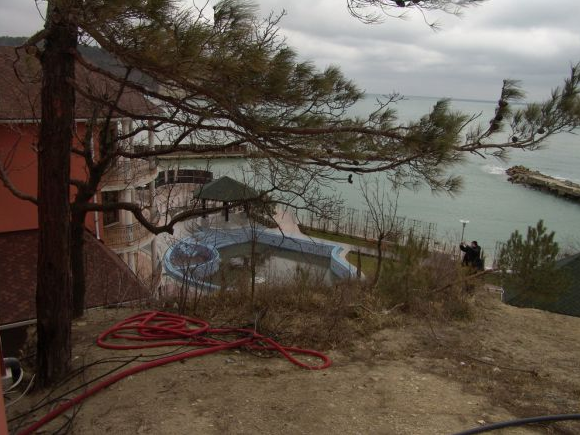
Second, the yacht dock near Gelendzhik, according to a confessional letter sent to Russia’s Prime Minister Dmitry Medvedev in 2010, services a billion-dollar, 70-hectare front-row-seat Olympic spread built for none other than President Putin out of a medical equipment fund created by Putin and a group of wealthy businessmen in 2000.
According to one of the fund’s contributors and managers, Sergei Kolesnikov, who wrote the letter to Medvedev, the fund was kept liquid “mainly through a combination of corruption, bribery, and theft.”
Kolesnikov’s letter – now widely available on the Internet in Russian – detailed that the initial plan was to use contributions from Russian businessmen to purchase medical equipment for clinics in St. Petersburg, diverting 35 percent of the contract payments to offshore accounts. By 2005, a year after Moscow brass decided to develop a bid for the 2014 Winter Olympics, the “Putin Palace” was already under construction.
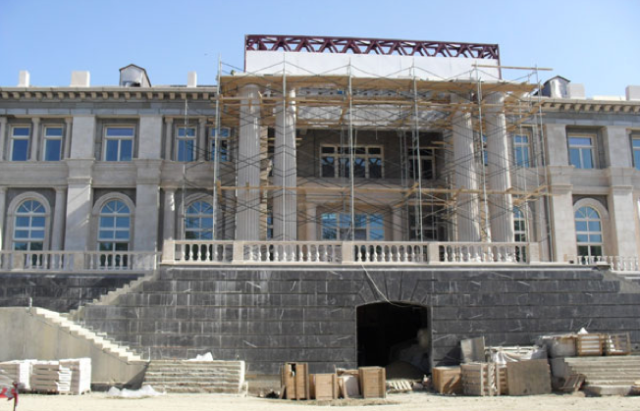
Kolesnikov wrote in his letter that, by October of 2009, he was regularly reviewing invoices and other financial records projecting that spending on the mansion had reached $1 billion. Both Kremlin spokesmen and Medvedev have denied Kolesnikov’s assertions. Kolesnikov, meanwhile, has gone into hiding abroad.
The further connections of the property to Putin by Gazaryan, who reported in his blog (in Russian) about the frequent presence of Putin’s personal yacht at the dock, put the environmentalist in special jeopardy.
The guards who had intercepted Gazaryan and his colleagues on August 2012 filed a report that didn’t make any allusions to a violent attack. But, Garazyan told Bellona they also paraded out a beaten and bloodied colleague and blamed Gazaryan for his injuries.
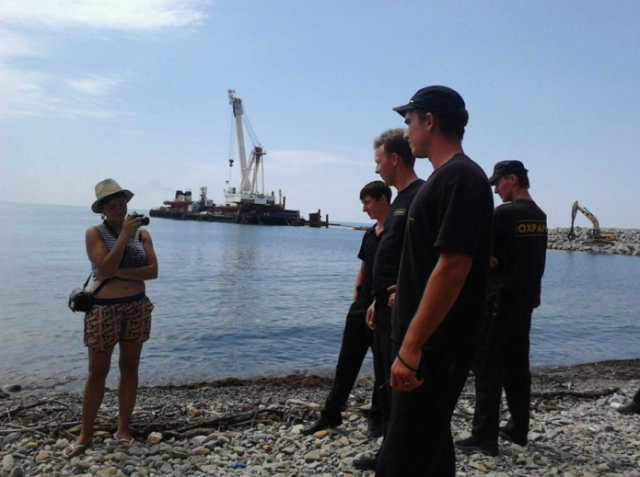
According to Gazaryan, the ecological damages resulting from the building of the Putin Palace total more than $82 million.
Flight
Between August and October 2012, Gazaryan’s probation and the allegations that he had threatened a guard on that dock in Gelendzhik snowballed. He phoned by authorities who said they were investigating charges of attempted murder and asked him to come in for questioning. This, combined with his probation, would have meant a five-year prison sentence.
“I knew that governor Tkachev considered me his enemy for proving that the mansion on the Black Sea, built in violation of water and forest codes, actually belonged to him, on official papers.” Gazarian said. “I had information that Tkachev had personally ordered the police to put me in jail. So, I decided to leave the country,”
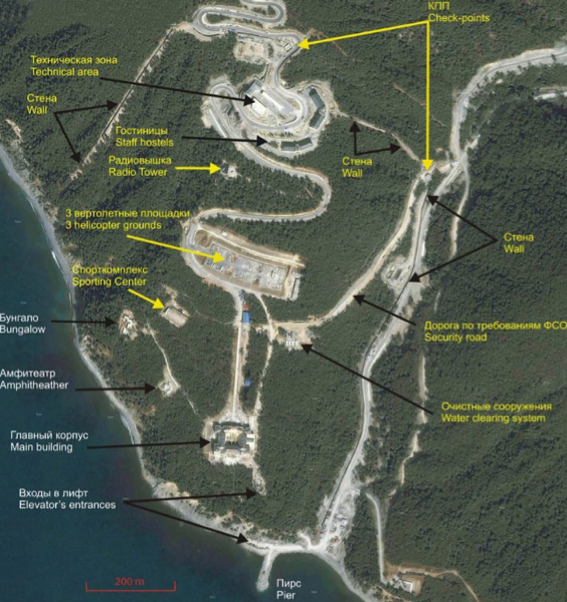
In October 2012, he arrived in Tallinn, via Georgia, separated from his family, relying on friends, with a hope of political asylum – but with the abiding conviction that the entirety of the Kremlin’s Olympic push was a completely corrupt legal and environmental train wreck.
He rented a small flat with grant money he said he’d received from an NGO, Front Line Defenders, and set up shop with the few possessions to continue publish his withering criticism of Olympic environmental and financial corruption.
“The authorities are determined to silence Gazaryan because he refused to stop criticizing authorities for corruption and for environmental issues,” said Yulia Gorbunova, a Moscow-based researcher at Human Rights Watch. “The authorities need to end their blatant retaliation against government critics.”
Crony dachas just the tip of the iceberg
But EWNC’s efforts to reveal the illegal construction of the Putin and Tkachev residences did a lot more than that. In all, some 1,000 hectares of World Heritage forests were leveled for crony residences and their infrastructure – roads, helipads, power lines, and an illegally placed ski resort.
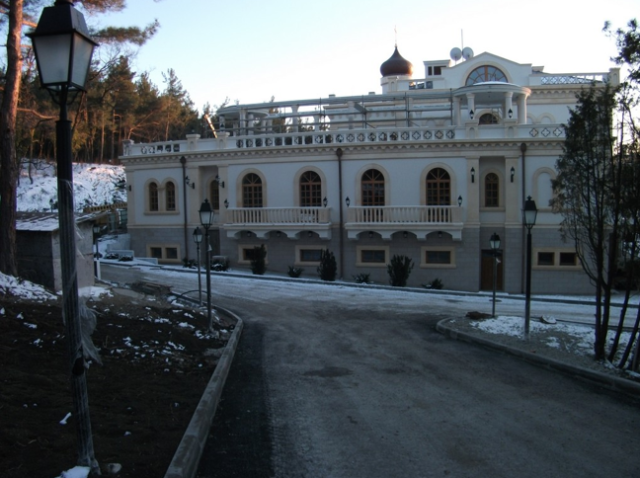
Gazaryan rattled off that in addition to the residences, Putin also has two guest houses for visiting officials in the Krasnaya Polyana area, built in protected lands surrounding the Olympic ski runs; a mansion for Orthodox Church Patriarch Kirill near the village of Divnomorskoye; and two vacation homes for Russian businessman and former defense minister Anatoly Serdyukov – one near the town of Anapa and the other near the village of Taman. In total, the mansions for Moscow’s elite and the infrastructure to maintain them take up, in Gazaryan’s calculations, some 1000 hectares.
Serdyukov was on December 6th charged with negligence in a case that alleged he, in his former role as defense minister, ordered Russian soldiers to construct a road to his brother-in-law’s lavish Dacha.
Serdyukov is at the center of a multimillion-dollar fraud scandal, and an amnesty bill submitted by Putin to the Duma on December 9 may serve as a convenient way for the Kremlin to make this hugely embarrassing problem go away.
The shady deals that occasioned these criminally constructed funhouses and facilities, however, are not foremost on Gazaryan’s mind. What bothers him most is the legal chicanery that allowed them to be built in the first place, and the absolute loss of the preserved lands on which they sit, which is now irredeemable.
“No matter who you are, it is illegal to build huge summer homes in the protected forests around the Black Sea,” he said, his reserved voice turning to booming prosecutorial authority in the deserted café. “You can’t just go and change laws without state environmental inspections.”
And this, essentially, is the whole of his argument: The endemic corruption of the Putin administration has manifested itself in the rape of the North Caucasus. The outcome was foreseeable as soon as Russia won the bid, and what has been thousands of years in the making will be undone for the sake of two weeks in the international spotlight.
“I used to live a normal life – but these circumstances, the Olympics, have made life abnormal for everyone.”
Smashed work leading to international attention
For all intents and purposes, the EWNC is now rudderless. Environmental blogger and regular contributor to Bellona’s Russian pages Dmitry Shevchenko and Andrei Rudomakha, both of whom are routinely stopped and detained by police, do what they can to keep things going. Shevchenko was in November detained at Sochi’s airport four for hours for no apparent reason. He filmed his detention (in Russian).
Rudomakha has meanwhile been stopped by traffic police regarding “slander” charges pending against him for a report the EWNC intends to publish, called “Environmental Impact of the Preparation to Sochi 2014 Winter Olympics. Independent Report.” During the heat of March’s nationwide crackdowns on NGOs, the FSB, the Center for Combating Extremism and Prosecutor’s Office told EWNC not to publish the report, as it will “damage Russia.”
Rudomakha has vowed to publish the report despite the political threats.
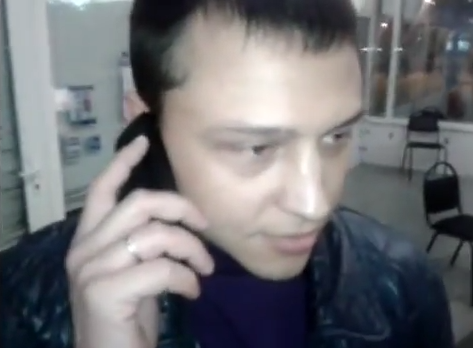
According to Shevchnko, the entire EWNC membership has been registered by the local police as “political undesirables.”
Vitishko – Gazaryan’s co-defendant in the “fence incident” – can only leave his house between the hours of 9 am and 6 pm because of the curfew imposed on him as a condition of his suspended sentence.
Add to that, the organization has been notified by the federal government that it must declare itself a “foreign agent.”
“We have no intention of ever doing that,” Gazaryan said in Tallinn. “We will have to close down and reform in another way.”
But, for the whole juggernaut of the Russian state and the Olympic movement – which are essentially inseparable – some small rays of hope have begun to shine through the rubble.
First, the landfill in the Akhshtyr quarry is getting international attention since it was brought to light by the Associated Press in October. A December 5 article in Sochinskiye Novosti (in Russian), a publication that is fiercely and fearlessly critical of the Olympics, indicated numerous municipal improvements were taking place thanks to the flood of international journalists covering the illegal dump.
The AP report also provoked a response from Norwegian International Olympic Committee (IOC) member Gerhard Heiberg, who wants an independent investigation.
When contacted in Oslo, Heiberg referred Bellona to IOC spokeswoman Emanuel Moreau. She confirmed by email that the Akshtyr quarry was an illegal dump and “which at one point was handling construction waste and that the organizations responsible have been fined.”
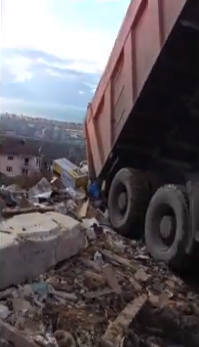
The latest information the IOC has received from Sochi 2014 Organizing Committee, said Moreau, was that “no further solid or construction waste is being placed in the quarry,” as confirmed by monitoring from numerous Russian governmental and Olympic monitoring officials.
“The quarry is also now undergoing a rehabilitation process that envisages, among other solutions, the establishment of a ‘clay lock’ to prevent underground waters from flowing through the rehabilitation materials that are being used,” wrote Moreau. “In addition, specialists from an accredited laboratory take regular tests of the rehabilitation materials.”
Moreau did, however, write the IOC Zero Waste Policy is only applicable to the two weeks during which the Games take place.
“Sochi 2014’s zero waste objective is linked to its operational waste at Games-time and [the Organizing Committee has] given us every assurance of their commitment to that objective,” she wrote.
Meanwhile, a major documentary called “Putin’s Games,” detailing the breathtaking level of corruption, extortion, human rights abuses, and environmental problems stemming from the Sochi bid had two – albeit heavily policed – screenings in Moscow on December 6 and 7. It will air again on the independent Tomsk TV2 for Siberian audiences.
Russian government trying to buy off negative coverage
Producer Simone Baumann says she was approached on three occasions by Russian officials proposing to buy the controversial film, Radio Liberty reported. The bids for her to sink the film, none of which she took, reached nearly $1million.
Russia’s Supreme Court has also approved Vitishko and Gazaryan’s request for the fence incident to be retried, with the new hearing scheduled for December 18. The bad news is that the appeal to overturn the convictions will be heard in the same court in Krasnodar Region that initially convicted them – and where Tkachev’s long shadow holds sway.

In Tallinn, Gazaryan told Bellona that a successful appeal might lead to clearing the attempted murder charges against him – or at least reduce the severity of the offense to a point that would allow him to return home to his family.
As soon as he uttered that hopeful prayer, however, he stopped and tapped his spoon against his coffee mug, again piercing the silence of the muffled café.
“Tkachev – this is a guy who holds grudges,” he said. “I can’t go back for the appeal and it’s just as probable that Vitishko will get his three-year suspended sentence turned into real jail time.”
The grey Tallinn sun is starting to set, and the frozen spattering of rain droplets on the café window begin to split the street lamps’ light into tiny prisms.
With no hostility toward anyone in particular, Gazaryan breaks a long silence and says, “an entire part of the country has been destroyed. This is what the Olympics will mean, this is what they’ve done – and it will all be forgotten.”
This is the first article in a series of articles Bellona is producing on the Sochi Olympic Games.

Our November Nuclear Digest by Bellona’s Environmental Transparency Center is out now. Here’s a quick taste of just three nuclear issues arising in U...

For three years now, Bellona has continued its work in exile from Vilnius, sustaining and expanding its analysis despite war, repression, and the collapse of international cooperation with Russia in the environmental and nuclear fields

The Board of the Bellona Foundation has appointed former Minister of Climate and the Environment Sveinung Rotevatn as Managing Director of Bellona No...

Økokrim, Norway’s authority for investigating and prosecuting economic and environmental crime, has imposed a record fine on Equinor following a comp...